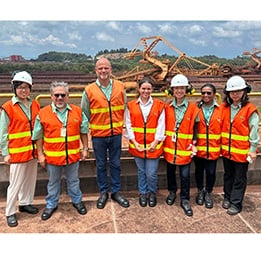

| Vale




Vale
What are the most significant cases or transactions that your legal team has recently been involved in?
Over the past year, our work has included providing commercial support to projects developing Vale’s mega hubs across Asia and Middle East, iron purchase and blending projects in Asia, the restructuring of its companies in Australia and Oman and the negotiation of contracts of affreightment and commodity sales. We have also played a role in managing arbitration in London, assisting the company in navigating the increasing complexity of regulatory requirements in countries such as China and the introduction of new employment laws in Malaysia and Oman, where we have substantial operations.
Can you sum up the team culture or ethos?
First, get close to, understand and be part of the business. It is critical to understand the business and how our work supports it. Not only does it mean we can provide quality support, but it builds trust and confidence in the team and our work. We need to provide the ‘trusted advisor’ role.
Second, keep learning. We need to be able to spot an issue and provide an initial opinion, even when external support is required to dig deeper. It is also important for the senior team members to teach and develop the junior members. It is harder to do in-house, but just as important as it is in a law firm.
Finally, use the right person for the work. Although our team is physically based across Asia, Middle East, and Europe, we do not always make decisions about managing work by reference to location. Other business teams do not work in silos, and neither should we. It means that our clients around the world can have consistency and efficiency in legal support. It also provides our team members with the opportunity to experience and learn in different jurisdictions and cultures.
How does the in-house legal team contribute to the overall dispute resolution strategy of the organisation?
Sometimes, the best dispute resolution strategy is to avoid a dispute. Our business is not about litigation and arbitration. When an issue arises, we look at it and consider the best legal strategy to take considering the specifics and what is in the best interests of the company. It is a bit like the triage system in a hospital.
However, other times they are unavoidable. An important part of dispute management occurs even before we get to that stage. We like to understand the different legal systems and dispute resolution forums in the jurisdictions where we operate. A contract with a good dispute resolution clause and using a legal system with which we are comfortable, will make a substantial difference later.
Of course, once a formal dispute has started, it (and the law firm) needs to be closely managed, keep our internal clients informed, keep a ‘cool head’ in the process and always remember to keep an eye on what is best for the company.